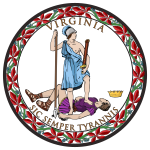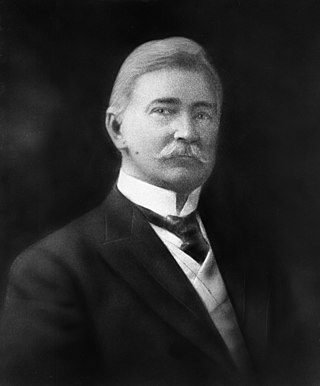On February 1, 1820, James Johnson (DR) of Virginia's 20th district resigned [1] from his position as Representative. A special election was held to fill the resulting vacancy
| Elections in Virginia |
|---|
 |
On February 1, 1820, James Johnson (DR) of Virginia's 20th district resigned [1] from his position as Representative. A special election was held to fill the resulting vacancy
| Candidate | Party | Votes [2] | Percent |
|---|---|---|---|
| John C. Gray | Democratic-Republican | 967 | 52.6% |
| Arthur Smith | Democratic-Republican | 873 | 47.4% |
Gray took his seat on November 13, 1820 [3]

Albert Harold "Al" Quie was an American politician and farmer. Quie served as a member of the United States House of Representatives from 1958 to 1979 and as Governor of Minnesota from 1979 to 1983.

Frederick Huntington Gillett was an American politician who served as the 42nd Speaker of the United States House of Representatives from 1921 to 1925 and as a U.S. Senator from Massachusetts from 1925 to 1931. A Republican, Gillett first began his career in politics when he served in the Massachusetts House of Representatives from 1890 to 1891, and would go on to serve in the House from 1893 to 1925. At the time of his election, he was the oldest individual elected to a first term in the Senate, a record that he would hold until Peter Welch's victory in the 2022 United States Senate election in Vermont 98 years later.

A joint session of the United States Congress is a gathering of members of the two chambers of the bicameral legislature of the federal government of the United States: the Senate and the House of Representatives. Joint sessions can be held on any special occasion, but are required to be held when the president delivers a State of the Union address, when they gather to count and certify the votes of the Electoral College as the presidential election, or when they convene on the occasion of a presidential inauguration. A joint meeting is a ceremonial or formal occasion and does not perform any legislative function, and no resolution is proposed nor vote taken.

John G. Richardson was an American politician and consultant from Maine. A Democrat, he served as Maine's Commissioner of Economic and Community Development and the Speaker of the Maine House of Representatives. Richardson unsuccessfully sought the Democratic nomination for Governor of Maine in 2010. In February 2018, the Portland Press Herald reported that Richardson was involved in a potential conflict of interest case regarding the University of Maine and a $100 million redevelopment plan for the nearby Old Town mill. On February 9, 2018, the Portland Press Herald reported that there weren't any conflict of interest issues involving UMaine or Richardson.

William Bailey Lamar was an American attorney and politician who served as a U.S. representative from Florida from 1903 to 1909.

Donald Milford Payne Jr. was an American politician who was the U.S. representative for New Jersey's 10th congressional district from 2012 until his death in 2024. A member of the Democratic Party, Payne served as president of the Newark city council from 2010 to 2012.
On October 15, 1824, Charles Rich of Vermont's at-large district died in office. A special election was held for his replacement.

The 1816 special elections for Maryland's 5th congressional district were to fill two separate vacancies. The 5th district was a plural district, with two seats. Both seats were vacated, the first by Representative Nicholas R. Moore (DR) in 1815, before the 14th Congress even met, and the second by Rep. William Pinkney (DR) on April 18, 1816 after being named Minister to Russia.

On May 27, 1815, Representative Matthew Clay (DR) of Virginia's 15th district died in office before the start of the 1st session of the 14th Congress. A special election was held in October of that year to fill the resulting vacancy.

On July 4, 1816, Representative Thomas Gholson, Jr. (DR) of Virginia's 18th district died in office. A special election was held to fill the resulting vacancy on October 10, 21–23, and 28, 1816.

During the 15th Congress, there were two special elections in the 6th district of Pennsylvania, both held in the year 1818. The 6th district at that time was a plural district with two seats, both of which became vacant at different times in 1818. The first vacancy was caused by John Ross (DR) resigning on February 24, 1818 and the second was caused by Samuel D. Ingham (DR) resigning July 6.

On April 20, 1818, Jacob Spangler (DR) resigned from Congress, where he'd represented Pennsylvania's 4th district. A special election was held that year to fill the resulting vacancy.

On December 20, 1820, Jesse Slocumb (DR) of North Carolina's 4th district died. A special election was held to fill the resulting vacancy

On May 15, 1820, David Fullerton (DR) of Pennsylvania's 5th district resigned from his seat in the House of Representatives. A special election was held on October 10, 1820 to fill the resulting vacancy. This election was held on the same day as the election for the 17th Congress.

On July 6, 1820, James Pindall (F) resigned from his position as Representative for Virginia's 1st district. A special election was held to fill the resulting vacancy.

On February 10, 1820, George F. Strother (DR), Representative for Virginia's 10th district, resigned, having been appointed as receiver of public money in St. Louis, Missouri. A special election was held to fill the resulting vacancy
A special election was held in Massachusetts's 1st congressional district on October 23, 1820 to fill a vacancy created by the resignation of Jonathan Mason (F) on May 15, 1820. As a majority was not achieved on the first ballot, a second ballot was held November 6, 1820
A special election was held in Massachusetts's 8th congressional district on October 16, 1820, and November 24, 1820, to fill a vacancy caused by the resignation of Zabdiel Sampson (DR) on July 26, 1820.
A special election was held in 1820 in Massachusetts's 13th congressional district to fill a vacancy caused by the resignation of Edward Dowse (DR) on May 26, 1820